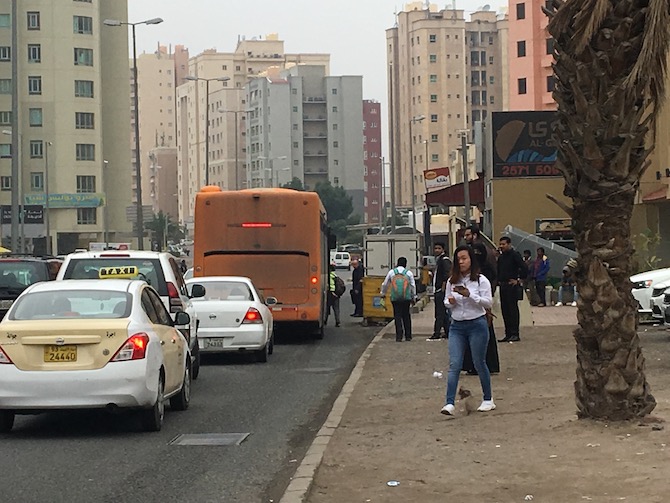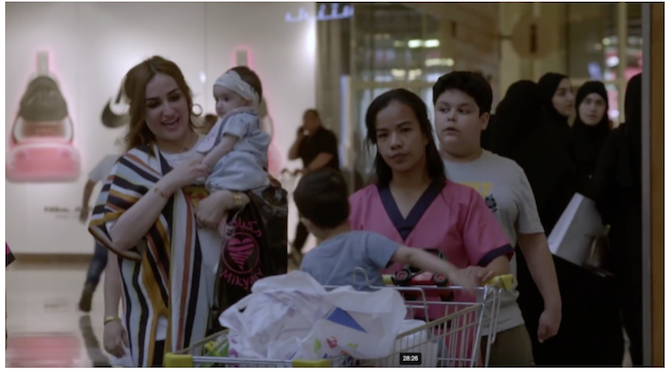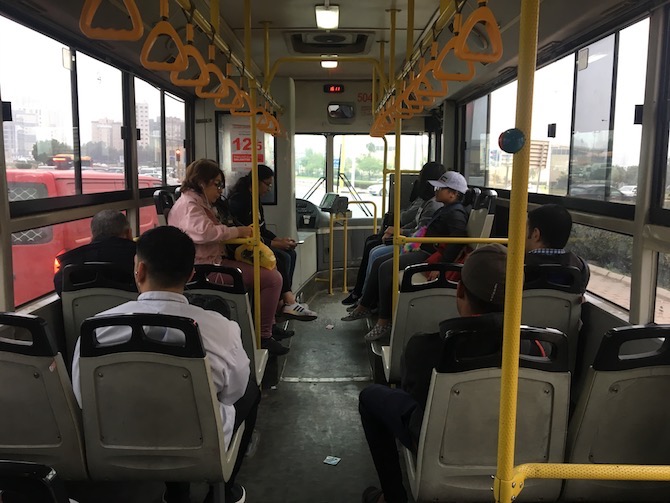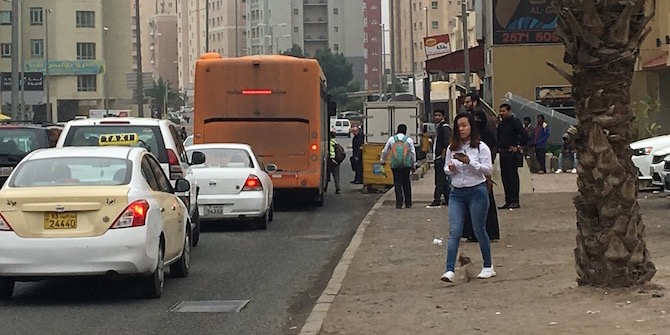by Reem Alfahad and Muhammad Adeel

In the previous blog post on Transport Equity in Kuwait, we discuss our initial findings from a range of focus groups conducted in 2019 with the support of KFAS. The focus groups revealed stark differences between the experiences of male and female transport users. In this blog post, we discuss the gender specific barriers that came up in order to encourage further gender specific transport research in the Gulf region.
Our focus groups held in March 2019 were not focused exclusively on gender, but once we identified a clear need for further gender-specific insight, we conducted six in-depth interviews with female residents; three foreign domestic care workers (of Indian, Ethiopian, and Filipino origin), one foreign middle-income retail worker (Filipino), and two Kuwaiti women of different ages. The women spoke about their own experiences, as well as their perceived experiences of women in their socioeconomic and ethnic identity groups.
Findings
The findings show us that, similarly to our more general focus groups, mobility access for women largely relates to citizenship and class.

Domestic Care Workers
The most common nationalities in this group are: Nepali, Filipino, Indian, Sri Lankan, Indonesian and Ethiopian. They tend to have minimal language skills, have low-income backgrounds and live with their employer where the lines between work and personal life are often blurred.
Challenges
Domestic care workers have no day off; they are legally required to have one day off per week, but in practice most do not get any days off for the duration of their (usually) two-year contract. This is a major barrier to access; it is taken for granted that these domestic care workers forego their individual social needs for the duration of their contracts.
They live in Kuwaiti homes which poses another issue. Bus routes do not go through Kuwaiti neighbourhoods, so they are required to take a taxi or rely on the family for mobility needs, which creates further dependency on the employer.
The cost of transportation is another obstacle they face. Taxis are relatively expensive for their minimum income salaries, which deters many of them from going out if they are lucky enough to have a day off.
There is also a language/cultural barrier. Though some do use the bus because their employer happens to live near a bus route, many express an inability to navigate the new cultural landscape, and many report that their gender makes them more prone to being taken advantage of should they ask for directions or seek help.
Middle and High Income Expat Women
This category includes women who work in retail, the food and beverage industry, administration and nursing. The most common nationalities in this group are: Filipino, Lebanese, Indian, Egyptian, Palestinian and Syrian.
The members of this group live in expatriate apartment buildings, usually among people of the same nationality where English or Arabic is used to communicate with the local population. They exist in a separate cultural/social sphere from their Kuwaiti counterparts.
Laws prevent people within this group from obtaining a driver’s licence. Aside from the general barriers that exist in obtaining a licence (minimum salary, position, etc), women with children are more likely to be granted a licence because this demonstrates “need” – which puts women without children at a disadvantage.
Constant cultural negotiations occur. Without a licence, middle-income employees make up the majority of public transport users. Women state that this means they are constantly entering male spaces; male-driven taxis with no fare regulation, male-dominant buses and streets that are unaccustomed to female pedestrians in this region, particularly at night. Many wish they could drive a private vehicle merely to avoid the constant inevitable contact with strange men, where they are continually having to negotiate their own safety and avoid unwanted attention.
There is a fear of sexual harassment. When entering these male-dominant public spaces designed to facilitate mobility, many women disclose that they suffer from constant staring, comments on appearance and even physical abuse by the male passengers. The informal “first three rows are for women” on buses is not always respected and there is a sense that just entering these spaces makes them vulnerable to potential assault.
The group is considered second class. Given their migrant status, precarious employment and/or perceived notions that the majority population deems migrant workers “interchangeable” and “replaceable,” many women do not approach authorities or report abuse because they think either the authorities will use this as justification for deportation or termination of employment or inflict further emotional/verbal or physical abuse on them (as there are usually men in positions of authority).

Mixed-Income Kuwaiti Females
Women in this group have their livelihood heavily subsidised by government. Their main form of transportation is private vehicle, and laws prohibit Kuwaiti women from renting/owning a home without a marriage certificate/a male.
There is a social stigma associated with public transport use. Aside from physical barriers to access (a lack of sufficient bus stops in Kuwaiti neighbourhoods, limited routes), there is a large social stigma attached to public transport use (often cast as for “foreigners,” “dirty” and “dangerous” – despite minimal or no actual exposure to these buses among the Kuwaiti population.) Given the stigma, some state that using the bus would bring “shame” on the family.
There is also the subject of privacy. Certain Kuwaiti women expressed a need for the car to be “her” space as her home life lacks privacy (particularly as Kuwaitis tend to live with their families until they get married), so the car becomes the haven in which a women exercises autonomy, has her first sexual experiences, and/or creates a boundary between home and her life. In conservative households, female ownership of cars is deemed shameful for those same reasons.
There is fear of sexual harassment. Kuwaiti women expect or have experienced “staring” on public buses or other spaces in which they interact with the migrant male community. This makes them feel unsafe and unwilling to seek out public transport.
Male dominance in public culture has an effect on public transport use. For many, it is taken for granted that public life is “male” in this region and the expectation that a woman spends more time at home is embedded in day-to-day public life. Younger Kuwaiti women do not readily adhere to this, so several still speak of push back from the older generation and from male relatives if they come back “late” or they receive constant interrogation of “where they are going.” This indicates that barriers to access for women in this region can be societal; women may be able to move around but may risk being shamed for doing so, opting instead to hire a chauffeur so that their whereabouts are known to the family.
There are male expectations of “honour” or “reputation.” Many women express feeling as though their actions are constantly watched to preserve the “honour” of the family, inhibiting them from freedom of movement for fear of being perceived as being in the wrong “spaces” or when on public buses, seen as “poor.” Many report that if they are seen using a bus, it is assumed that their father is not sufficiently providing for her because she does not own her own car or is not being transported by a family member. Many fathers in the focus groups expressed a responsibility to transport their daughters as within the scope of providing for their family.
Conclusions and Moving Forward
This research makes evident the need to transform the current male-dominant transport system to better accommodate its female users. Many of these issues remain invisible not only to the predominantly male decision-makers in the Gulf, but also to the larger academic and transport community. The field researcher, Reem Alfahad, presented this research at the 2019 International Women Issues in Transportation Conference (WIiT) in Irvine, California, in which these findings became part of the global conversation in addressing gender-specific issues in transport. Look out for the full report of this research set to be published later this year.







“Laws prohibit Kuwaiti women from renting/owning a home without a marriage certificate/a male.”
That’s not true. Divorced women can rent or own homes. A young woman who has not been married can’t rent, but neither can a man.
As for Kuwaitis not using public buses, that’s the same for both men and women. I know the article is about women, but it should be pointed out that it’s the same for men.